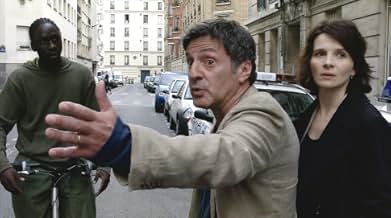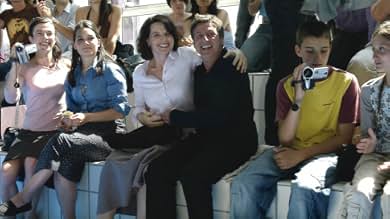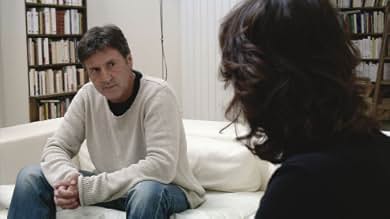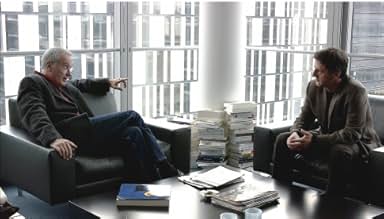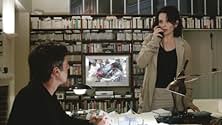एक विवाहित जोड़े को उनके सामने के पोर्च पर छोड़े गए निगरानी वीडियो टेप की एक श्रृंखला से आतंकित किया जाता है।एक विवाहित जोड़े को उनके सामने के पोर्च पर छोड़े गए निगरानी वीडियो टेप की एक श्रृंखला से आतंकित किया जाता है।एक विवाहित जोड़े को उनके सामने के पोर्च पर छोड़े गए निगरानी वीडियो टेप की एक श्रृंखला से आतंकित किया जाता है।
- पुरस्कार
- 29 जीत और कुल 37 नामांकन
फ़ीचर्ड समीक्षाएं
This was a very good film, an excellent study in psychological tension. Unfortunately, I don't think a lot of Americans or really anyone who isn't very familiar with the French-Algerian war will be able to understand it. It's about the horrors of that war and the French denial of their part in it -- very much tying in to the French youth race riots we saw last year. It also quietly draws some parallels with the war in Iraq. The ending was perhaps much too subtle. Everyone around me as we left the theater here in Los Angeles was expressing confusion. This was an older, more sophisticated audience, too. I don't think they really understood what was happening all along.
That said, it was still fantastic. I'm glad that at least outside of the U.S. it's gotten the recognition it deserves.
That said, it was still fantastic. I'm glad that at least outside of the U.S. it's gotten the recognition it deserves.
In Paris, Georges Laurent (Daniel Auteuil) is a famous host of a literary talk show on TV, who lives in a comfortable house with his wife Anne (Juliette Binoche) and their teenager son Pierrot (Lester Makedonsky). When Georges and Anne receives videotapes of surveillance of their private life and weird and gore childlike drawings, they go to the police, but they do not get any protection since there is not a clear menace to the Laurent family. When Georges follows a clue in one of the tapes that shows his childhood home, he meets his former adopted brother, the Algerian Majid (Maurice Bénichou) and accuses him of sending the tapes. Meanwhile, through glimpses of Georges' nightmares, his lies due to his jealous relationship with his foster brother are disclosed.
"Caché" is definitely an inconclusive movie, open to the most different interpretations, and this obvious based on the number of very intelligent and helpful discussions in IMDb Message Board. I am a fan of Michael Haneke, and I believe this is his intention, to promote a wide discussion about his movie at the same time he uses the historical moment in 1961 of the war between France and Alger. The last scene with Majid's son at Pierrot's school indicating that the may know each other just increases the possibilities. Anyway, the tense and realistic story of guilty and paranoia is very original and without the usual clichés of Hollywood movies. My vote is seven.
Title (Brazil): "Caché"
"Caché" is definitely an inconclusive movie, open to the most different interpretations, and this obvious based on the number of very intelligent and helpful discussions in IMDb Message Board. I am a fan of Michael Haneke, and I believe this is his intention, to promote a wide discussion about his movie at the same time he uses the historical moment in 1961 of the war between France and Alger. The last scene with Majid's son at Pierrot's school indicating that the may know each other just increases the possibilities. Anyway, the tense and realistic story of guilty and paranoia is very original and without the usual clichés of Hollywood movies. My vote is seven.
Title (Brazil): "Caché"
Michael Haneke's film begins as a clinical, psychological and social study of a respectable individual in European society. It ends as a study of a larger contemporary European segment of its population. It reminds one of the early works of Fassbinderonly Haneke's production values are more sophisticated. The camera becomes a charactera major one at that. This reminds the viewer that he is watching cinema at several junctures and that s/he is part of the communication/entertainment process. It makes you constantly ponder if the cinema you are watching is providing truth or lies (or something in between) 24 frames per second. The fixed-medium range shots that opens and closes the film indicate the view and mood of the director--clinical, somewhat distanced and unshaken by the story he unfolds. We also notice that what we are seeing, might not be what we think we are seeing. Antonioni did this to us in "Blow up" several decades ago.
After the screening at the on-going Dubai film festival, I was amused at the director carefully distancing himself from a situation where he could have resolved the issues-he prefers to leave it to the viewer to do so. In a way the entertainment continues after the screening if you choose to reflect on what you saw.
At the obvious level, it is a study of colonial guilt of Europe and race relations. At a deeper level, it probes complacency and bourgeois temperaments of the financially secure classes in society. Escape from reality comes from closing curtains, shutting off the outside world and consuming sleeping tablets. At another level, the film explores the attitudes of three distinct generations towards social relationships.
Haneke uses graphic shocking violent scenes to jolt the audiences when they least expect it. He seems to enjoy the process. His strength is not in his cinema (Kubrick, in comparison, was brilliant at this game). Hanneke's strength lies elsewhereeliciting fascinating performances from his cast. Daniel Auteuil, Julliette Binoche, Maurice Benichou and Annie Girardot were simply fascinating to watch.
The strength of the film lies in the subject that will disturb anyone. Many of us have something in our past that we wish to hide or not discuss. Yet there is a conscience in us that nags us to believe that there was a witness to that wrongdoing--a witness who cannot be buttonholed. It is this psychological fact that makes the film tick, much less its cinematic flourish.
After the screening at the on-going Dubai film festival, I was amused at the director carefully distancing himself from a situation where he could have resolved the issues-he prefers to leave it to the viewer to do so. In a way the entertainment continues after the screening if you choose to reflect on what you saw.
At the obvious level, it is a study of colonial guilt of Europe and race relations. At a deeper level, it probes complacency and bourgeois temperaments of the financially secure classes in society. Escape from reality comes from closing curtains, shutting off the outside world and consuming sleeping tablets. At another level, the film explores the attitudes of three distinct generations towards social relationships.
Haneke uses graphic shocking violent scenes to jolt the audiences when they least expect it. He seems to enjoy the process. His strength is not in his cinema (Kubrick, in comparison, was brilliant at this game). Hanneke's strength lies elsewhereeliciting fascinating performances from his cast. Daniel Auteuil, Julliette Binoche, Maurice Benichou and Annie Girardot were simply fascinating to watch.
The strength of the film lies in the subject that will disturb anyone. Many of us have something in our past that we wish to hide or not discuss. Yet there is a conscience in us that nags us to believe that there was a witness to that wrongdoing--a witness who cannot be buttonholed. It is this psychological fact that makes the film tick, much less its cinematic flourish.
If you've just seen "Cachê" and are still (understandably) in shock, not knowing whether you really liked it or not, let me ask you a few questions. Now, when was the last time a film:
a) had you glued to your seat as in "Caché", your eyes and neurones required to work in full gear from beginning to end, making it impossible to erase it out of your mind (instead of the instantly forgettable films you see every week), and actually making a second viewing almost compulsory?
b) posed such complex, multi-layered questions -- socio-political ones (the shameful, violent legacy of past and present imperialist nations, the manipulation of "reality" by the State and the media), existential ones (the racial, class and social prejudices that we all carry and have to fight within ourselves), and more prosaic ones, like trying to solve a complicated thriller? When were they so masterly interwoven?
c) made you aware that your explanation for the movie's most immediate, "practical" question (who's sending the tapes to Georges) will be influenced by your own background and prejudices?
d) had such a controversial and rich ending? (I could think of at least five possible denouements, even considering that I DID see the two boys -- q.v. the multiple theories about the ending in "Caché"'s message boards here in IMDb).
"Caché" is one of the few real masterpieces of the 2000s. The mix of socio-political comment with the thriller genre is not new, of course (you can go back at least to great German silent films by Lang, Murnau, Dieterle, Pabst). In 2005 alone, Cronenberg made the half-successful "A History of Violence", Spielberg the underachieved "Munich", Stephen Gaghan the overwrought "Syriana", Paul Haggis the soap-operatic "Crash". But Haneke asks us and gives us much more: he demands our ability to fill in the many important historical and political gaps, messes with our prejudices but respects our intelligence, and knows that a good part of us viewers are bored to death of being spoon-fed with one-digit I.Q. plots in mechanical thrillers inhabited by tired, phony "archetypes" of good x evil characters.
"Caché" is a monumental proof of Haneke's COMPLETE command of his craft. Artistic achievements like this are now SO rare in films that "Caché" feels like a happening -- a work of art that is mind-boggling, hypnotic and physically unnerving, ethically and esthetically disturbing, combining the sense of revelation and discomfort you get with the best political films with the braincells workout you get with the best thrillers.
As I left the theater, three masterpieces immediately came to my mind: Clouzot's "Le Corbeau" (a political statement disguised as a thriller and a probable inspiration for "Caché"), Antonioni's "The Passenger" (ditto, and also for the long, breathtaking, "open-meaning" last shot) and Resnais' "Marienbad" (the seminal film of multi-layered possible interpretations of "reality"). "Caché" stands tall on its own, reaffirming Haneke as one the top-5 working directors of the 2000s. Can't wait for his next film -- but while I do, I'll watch "Caché" one more time, and understand that hiding (Georges hiding his past and his feelings, nations hiding shameful parts of their history, Haneke hiding evidence, explanations and conclusions) can be a form of powerful revelation...and self-revelation.
a) had you glued to your seat as in "Caché", your eyes and neurones required to work in full gear from beginning to end, making it impossible to erase it out of your mind (instead of the instantly forgettable films you see every week), and actually making a second viewing almost compulsory?
b) posed such complex, multi-layered questions -- socio-political ones (the shameful, violent legacy of past and present imperialist nations, the manipulation of "reality" by the State and the media), existential ones (the racial, class and social prejudices that we all carry and have to fight within ourselves), and more prosaic ones, like trying to solve a complicated thriller? When were they so masterly interwoven?
c) made you aware that your explanation for the movie's most immediate, "practical" question (who's sending the tapes to Georges) will be influenced by your own background and prejudices?
d) had such a controversial and rich ending? (I could think of at least five possible denouements, even considering that I DID see the two boys -- q.v. the multiple theories about the ending in "Caché"'s message boards here in IMDb).
"Caché" is one of the few real masterpieces of the 2000s. The mix of socio-political comment with the thriller genre is not new, of course (you can go back at least to great German silent films by Lang, Murnau, Dieterle, Pabst). In 2005 alone, Cronenberg made the half-successful "A History of Violence", Spielberg the underachieved "Munich", Stephen Gaghan the overwrought "Syriana", Paul Haggis the soap-operatic "Crash". But Haneke asks us and gives us much more: he demands our ability to fill in the many important historical and political gaps, messes with our prejudices but respects our intelligence, and knows that a good part of us viewers are bored to death of being spoon-fed with one-digit I.Q. plots in mechanical thrillers inhabited by tired, phony "archetypes" of good x evil characters.
"Caché" is a monumental proof of Haneke's COMPLETE command of his craft. Artistic achievements like this are now SO rare in films that "Caché" feels like a happening -- a work of art that is mind-boggling, hypnotic and physically unnerving, ethically and esthetically disturbing, combining the sense of revelation and discomfort you get with the best political films with the braincells workout you get with the best thrillers.
As I left the theater, three masterpieces immediately came to my mind: Clouzot's "Le Corbeau" (a political statement disguised as a thriller and a probable inspiration for "Caché"), Antonioni's "The Passenger" (ditto, and also for the long, breathtaking, "open-meaning" last shot) and Resnais' "Marienbad" (the seminal film of multi-layered possible interpretations of "reality"). "Caché" stands tall on its own, reaffirming Haneke as one the top-5 working directors of the 2000s. Can't wait for his next film -- but while I do, I'll watch "Caché" one more time, and understand that hiding (Georges hiding his past and his feelings, nations hiding shameful parts of their history, Haneke hiding evidence, explanations and conclusions) can be a form of powerful revelation...and self-revelation.
A conventional psychological thriller, a social polemic, or a serious work of art. To fully realise even one of these is an achievement, but to realise all three in a single piece of cinema is remarkable indeed.
On the most obvious level, Hidden is a thriller which, in traditional European fashion, gets under your skin in spite of long shots when nothing happens (nevertheless, it is not for the squeamish). Also in typical European fashion, it requires a little more concentration and attention span than the average Hollywood offering to interpret and understand.
George (Daniel Auteuil) and Anne (Juliette Binoche) are a typical well-to-do Parisienne family. George is a TV chat show host for a literary discussion programme, his wife and young adolescent son are normal and easy to identify with. The acting is such that we see them as real people, almost as if in a documentary.
The couple are watching a video. We don't realise this at first. It's simply a video of the outside of their house, nothing more. Then the tell-tale lines on the screen appear as the video is rewound and the camera pans back. There is nothing threatening about the video except that they do not know who took it - it was just delivered on the doorstep. The exact point from which the video was shot is hard to ascertain.
Further videos arrive - still nothing threatening (the police refuse to do anything), but we can not only sense the couple's mounting panic, we are part of it. Nothing in Haneke's film so far justifies the sense of horror which we share with George and Anne but it is intense and very real. George tries to make connections from the clues so far. He feels extremely threatened. He accuses someone from his childhood. The accused is convincing in his protestations of innocence. In this climate of fear and reprisal things can only get worse.
On a second level, Hidden can be taken as both social comment on the tensions between bourgeois France and the ethnic Algerians that inhabit the poorer areas. France is unable to accept or own up to its guilt in its historic treatment of these large minorities, either in the past or the present. As a dynamic that is almost microcosmic, it reaches out to a wider world of have and have-nots, where those with power refuse to acknowledge faults because there is no-one to make them say sorry. This is conveyed in the film first from the typical settings, from wealthy modern areas to more pitiful suburbs, subtle overlays with background TV programs mentioning Iraq (British involvement, of course, not French), and the symbolic way the characters are presented enabling them to be easily transposed to analogous settings. It is a stark condemnation of how those with power (but also with suppressed guilt and a trigger-happy tendency to make accusations) cause much more damage than is necessary because of such shortcomings.
On the third level, as a work of art, Hidden is much more insidious. Director Haneke uses the camera as a tool between him and the audience in such a way that it is impossible to remain a passive, almost hidden viewer. The type of audience that the film will appeal to (educated, probably affluent) is also the one that will be most unsettled. Haneke is doing much more than telling a story - he is using the power of images to interact with his audience in a way that they are not fully aware of (until later analysis).
Then there is the question of who shot the tapes. If you really enjoyed the film but struggle with the answer (which is turns out to be different depending on whether you view it as a psychological thriller or as a polemic/work-of-art), you can go to the official website (which saves me revealing it!) - at which point you will probably want to watch it again to see the details you missed from inattention.
Hidden is a remarkably accomplished work. It is difficult to watch any scene and think of Binoche as Binoche (or Auteuil as Auteuil) rather than the character being played. In terms of directorial technique it will no doubt be an inspiration to film-makers for years to come. In terms of films that can alter the way we view the world it is first class - all the more so for the fact that its message is indirect (or hidden) rather than displayed ostentatiously and openly. Working out the superficial answer to the puzzle is all the more satisfying after piecing the clues together yourself. Working out the deeper sense, persuades by allowing the viewer to come to an undeniable realisation. Are ytou still paying attention? Don't fall asleep in this movie . . .
On the most obvious level, Hidden is a thriller which, in traditional European fashion, gets under your skin in spite of long shots when nothing happens (nevertheless, it is not for the squeamish). Also in typical European fashion, it requires a little more concentration and attention span than the average Hollywood offering to interpret and understand.
George (Daniel Auteuil) and Anne (Juliette Binoche) are a typical well-to-do Parisienne family. George is a TV chat show host for a literary discussion programme, his wife and young adolescent son are normal and easy to identify with. The acting is such that we see them as real people, almost as if in a documentary.
The couple are watching a video. We don't realise this at first. It's simply a video of the outside of their house, nothing more. Then the tell-tale lines on the screen appear as the video is rewound and the camera pans back. There is nothing threatening about the video except that they do not know who took it - it was just delivered on the doorstep. The exact point from which the video was shot is hard to ascertain.
Further videos arrive - still nothing threatening (the police refuse to do anything), but we can not only sense the couple's mounting panic, we are part of it. Nothing in Haneke's film so far justifies the sense of horror which we share with George and Anne but it is intense and very real. George tries to make connections from the clues so far. He feels extremely threatened. He accuses someone from his childhood. The accused is convincing in his protestations of innocence. In this climate of fear and reprisal things can only get worse.
On a second level, Hidden can be taken as both social comment on the tensions between bourgeois France and the ethnic Algerians that inhabit the poorer areas. France is unable to accept or own up to its guilt in its historic treatment of these large minorities, either in the past or the present. As a dynamic that is almost microcosmic, it reaches out to a wider world of have and have-nots, where those with power refuse to acknowledge faults because there is no-one to make them say sorry. This is conveyed in the film first from the typical settings, from wealthy modern areas to more pitiful suburbs, subtle overlays with background TV programs mentioning Iraq (British involvement, of course, not French), and the symbolic way the characters are presented enabling them to be easily transposed to analogous settings. It is a stark condemnation of how those with power (but also with suppressed guilt and a trigger-happy tendency to make accusations) cause much more damage than is necessary because of such shortcomings.
On the third level, as a work of art, Hidden is much more insidious. Director Haneke uses the camera as a tool between him and the audience in such a way that it is impossible to remain a passive, almost hidden viewer. The type of audience that the film will appeal to (educated, probably affluent) is also the one that will be most unsettled. Haneke is doing much more than telling a story - he is using the power of images to interact with his audience in a way that they are not fully aware of (until later analysis).
Then there is the question of who shot the tapes. If you really enjoyed the film but struggle with the answer (which is turns out to be different depending on whether you view it as a psychological thriller or as a polemic/work-of-art), you can go to the official website (which saves me revealing it!) - at which point you will probably want to watch it again to see the details you missed from inattention.
Hidden is a remarkably accomplished work. It is difficult to watch any scene and think of Binoche as Binoche (or Auteuil as Auteuil) rather than the character being played. In terms of directorial technique it will no doubt be an inspiration to film-makers for years to come. In terms of films that can alter the way we view the world it is first class - all the more so for the fact that its message is indirect (or hidden) rather than displayed ostentatiously and openly. Working out the superficial answer to the puzzle is all the more satisfying after piecing the clues together yourself. Working out the deeper sense, persuades by allowing the viewer to come to an undeniable realisation. Are ytou still paying attention? Don't fall asleep in this movie . . .
क्या आपको पता है
- ट्रिवियाThere is no music, save for the theme on George's show, and background music at Anne's publishing party.
- गूफ़During the tape where Georges pulls up in his car and parks at night the headlights clearly cast a huge distinct shadow of the camera on the wall.
- भाव
Georges Laurent: Isn't it lonely, if you can't go out?
Georges's Mom: Why? Are you less lonely because you can sit in the garden? Do you feel less lonely in the metro than at home? Well then! Anyway, I have my family friend... with remote control. Whenever they annoy me, I just shut them up.
- क्रेज़ी क्रेडिटThe opening credits appear over a shot of the husband and wife's house, but they appear one by one and in rows. By the time the credits are over they are all shown together, much like they would on a poster or in the credits section of a movie trailer.
- कनेक्शनFeatured in Smagsdommerne: एपिसोड #3.13 (2006)
टॉप पसंद
रेटिंग देने के लिए साइन-इन करें और वैयक्तिकृत सुझावों के लिए वॉचलिस्ट करें
- How long is Caché?Alexa द्वारा संचालित
विवरण
- रिलीज़ की तारीख़
- कंट्री ऑफ़ ओरिजिन
- आधिकारिक साइट
- भाषा
- इस रूप में भी जाना जाता है
- Caché (Hidden)
- फ़िल्माने की जगहें
- 49 Rue Brillat-Savarin, Paris 13, पेरिस, फ़्रांस(Georges' house)
- उत्पादन कंपनियां
- IMDbPro पर और कंपनी क्रेडिट देखें
बॉक्स ऑफ़िस
- बजट
- €80,00,000(अनुमानित)
- US और कनाडा में सकल
- $36,47,381
- US और कनाडा में पहले सप्ताह में कुल कमाई
- $57,010
- 25 दिस॰ 2005
- दुनिया भर में सकल
- $1,61,97,824
- चलने की अवधि
- 1 घं 57 मि(117 min)
- रंग
- ध्वनि मिश्रण
- पक्ष अनुपात
- 1.78 : 1
इस पेज में योगदान दें
किसी बदलाव का सुझाव दें या अनुपलब्ध कॉन्टेंट जोड़ें

